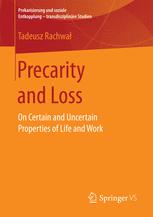

Most ebook files are in PDF format, so you can easily read them using various software such as Foxit Reader or directly on the Google Chrome browser.
Some ebook files are released by publishers in other formats such as .awz, .mobi, .epub, .fb2, etc. You may need to install specific software to read these formats on mobile/PC, such as Calibre.
Please read the tutorial at this link: https://ebookbell.com/faq
We offer FREE conversion to the popular formats you request; however, this may take some time. Therefore, right after payment, please email us, and we will try to provide the service as quickly as possible.
For some exceptional file formats or broken links (if any), please refrain from opening any disputes. Instead, email us first, and we will try to assist within a maximum of 6 hours.
EbookBell Team

0.0
0 reviewsThe book is devoted to social and political interdependencies of life and work, the interdependencies in which the ideas of loss and deprivation are the founding incentives of the precariousness of the position and the status of the human subject. Loss of property in the economic sense, along with the loss of properties in epistemological terms have become a crucial measure of precarity through its dissociation from what Judith Butler calls “the organization and protection of bodily needs.” The book offers a proposition of multidisciplinary reading of origins and constructions of “anxiety of loss” as a constitutive trait of what may be called the “economization” (or, after Jean-Pierre Dupuy, “economystifacion”) of human condition through various discursive practices tying loss with lack, and in this way making the uncertainty of possessing certain properties into a sphere of politically controlled semi-ontological anxieties. The book also reads loss in terms of topographical disorientation and the idea of placelessness.